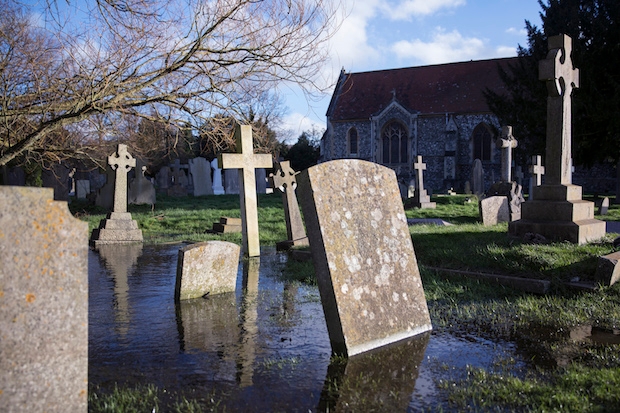Chris O’Carroll Time was these mossy stones drew reverent throngs As Sundays called the village to this place, But years have hushed our common prayers and songs. We thrive now on a different brand of grace.
Jazz concerts in this yard have we convened, And readings by the poets of the shire, About whose verses this much we have gleaned: Few know of them and fewer still admire.
The ladies of our garden club, without Their clothing, but discreetly screened by flowers, Have done that calendar you’ve heard about, Big seller in the gift shop. Check our hours.
Our website is the envy (deadly sin) Of all who work ye olde nostalgia zone. We’re finding ways to pull the punters in, And Melancholy marks me for her own.
Julie Steiner The rude forefathers of the hamlet sleep beneath this heaving, mould’ring turf, says Gray: for them no more their busy housewives keep their hearths and homes, for here is where they stay.
For them, these men whom Fame and Fortune failed to lionise — the guiltless Cromwells, mute inglorious Miltons, heroes who prevailed against their tyrant fields, without repute
beyond their quaint community — we spare some sympathy. We contemplate their graves. We offer up this elegy. We care. But what about those housewives, eh? Those slaves
who paced from laundry tubs to birthing beds and back, whom Fame chose also to condemn to unsung deeds and never-laurelled heads? Not even Gray can spare a thought for them.
Martin Parker A Planning Notice on our churchyard gate Proclaims the end of God in Speckley Down, His plot now destined for a tarmacked fate As link-road for the motorway to town.
Soon men will come to move these lichened stones And then in high-viz jackets dig our dead To sacrifice the sanctity of bones For faster trips to Sainsbury’s instead.
Then will our hallowed spot have sunk to this — From golden gateway for celestial souls, To quicker access to terrestrial bliss Via tins of Beanz and BOGOF toilet rolls.
Alanna Blake The little church surrenders to decay Beside this half-forgotten resting-place, Where once or twice lost sheep have gone astray And cropped the grasses in a hallowed space
Pull back the ivy tendrils, scrape through moss To where each stone emits a silent prayer, Read in the worn-down letters loss on loss: So many infant siblings buried there.
Six reverential yews for centuries Have guarded safely all these loved remains; Wild roses, rooted deep in memories, Drop dew and petals on time’s spreading stains.
Creep through the heavy creaking door at last, Breathe in the musty dimness for a while And sense, inside this icon of the past, The ghost of Philip Larkin in the aisle?
Bill Greenwell The stones are furred with moss, and stand askew; Inscriptions fox the eye, are blurred and worn; The warden’s left, the gardener’s overdue; At dusk, the local rooks pour forth their scorn.
Along the paths, and armed with their respects, The cousins come, with box files in their cars: Here is the boneyard in which each detects Their forebears, those whose language they must parse.
The ground is stern, unyielding: birth and death, The names, and salutations, seem erased — Beneath the yews, the land is out of breath: Too late, one feels, for such an eagle gaze.
At dusk, the strangers rev their old exhausts, And leave the churchyard (‘This is where I’m from’): The graveyard fades. Its occupants are sourced More usefully on ancestry.com.
Hugh King The mocking bleats of huddled downland sheep Greet those who come to evensong tonight, The dwindling few who quietly wish to keep The glimmering embers of the faith alight.
The tower has stood for seven hundred years. The font, of Purbeck stone, is older still. And they endure, untouched by ovine jeers, While darkness coolly falls on Shipton Hill.
The Nunc Dimittis and the grace release Us to a Dorset dusk where headstones stare And moles are left to spoil the turf in peace, Their mounds to parody the man-made there.
Far from the twitterati’s egofest, Where mobile-phone reception is not known, The unsung fathers of this village rest, And lichen writes their epitaphs on stone.
Your next challenge is to supply a short story entitled ‘Diary of a Superfluous Man’. Please email entries of up to 150 words to lucy@spectator.co.uk by midday on 23 March.





Comments